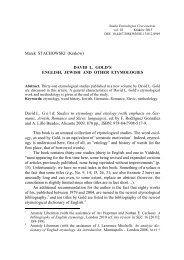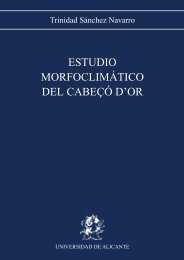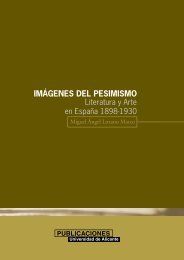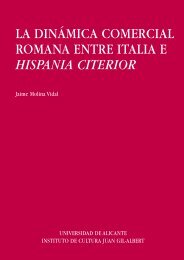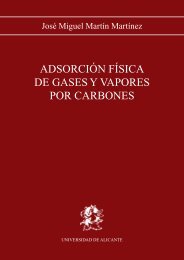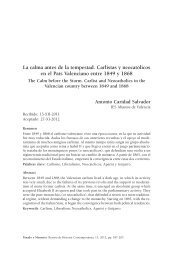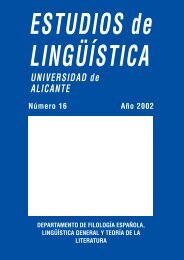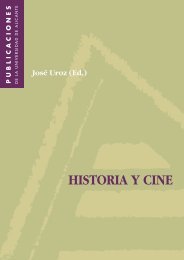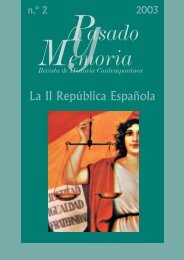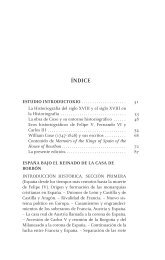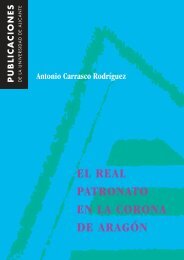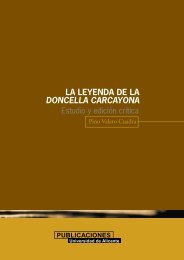English and Galician in the Middle Ages - Publicaciones ...
English and Galician in the Middle Ages - Publicaciones ...
English and Galician in the Middle Ages - Publicaciones ...
Create successful ePaper yourself
Turn your PDF publications into a flip-book with our unique Google optimized e-Paper software.
<strong>English</strong> <strong>and</strong> <strong>Galician</strong> <strong>in</strong> <strong>the</strong> <strong>Middle</strong> <strong>Ages</strong>:<br />
A Sociohistorical Survey<br />
Begoña Crespo García<br />
cen-tury onwards but which did not have a parallel <strong>in</strong> Galicia<br />
until <strong>the</strong> last quarter of <strong>the</strong> 20 th century.<br />
There are two key factors that determ<strong>in</strong>ed <strong>the</strong> different evolutions<br />
of <strong>English</strong> <strong>and</strong> <strong>Galician</strong>: a social factor, i.e. <strong>the</strong> necessary<br />
conditions for <strong>the</strong> expansion of a ris<strong>in</strong>g middle group were<br />
present <strong>in</strong> <strong>the</strong> <strong>English</strong> panorama although not <strong>in</strong> Galicia. As a<br />
consequence of <strong>the</strong> above-mentioned social factor <strong>the</strong> diglossic<br />
phenomenon left a deep impr<strong>in</strong>t on <strong>the</strong> collective psychology<br />
of <strong>Galician</strong> speakers -to <strong>the</strong> detriment of <strong>the</strong> vernacular’s<br />
prestige-, which has been transmitted from generation to generation<br />
up to <strong>the</strong> present day. The period of language contact<br />
<strong>in</strong> Engl<strong>and</strong> under <strong>the</strong> dom<strong>in</strong>ance of French <strong>and</strong> Lat<strong>in</strong> did not<br />
underm<strong>in</strong>e <strong>the</strong> l<strong>in</strong>guistic conscience of <strong>the</strong> <strong>English</strong> population<br />
who always defended, at least <strong>in</strong> <strong>the</strong> oral medium, <strong>the</strong> native<br />
code.<br />
Both languages, <strong>English</strong> <strong>and</strong> <strong>Galician</strong>, experienced an <strong>in</strong>itial<br />
situation of vernacular monol<strong>in</strong>gualism changed by <strong>the</strong> force<br />
of social events. The imposition of <strong>the</strong> language belong<strong>in</strong>g<br />
to <strong>the</strong> dom<strong>in</strong>ant group favoured <strong>the</strong> bil<strong>in</strong>gual panorama <strong>in</strong><br />
both communities <strong>and</strong> <strong>the</strong> subsequent functional distribution<br />
of <strong>the</strong> codes <strong>in</strong> contact <strong>in</strong> <strong>the</strong> form of diglossia. Never<strong>the</strong>less,<br />
<strong>the</strong> degree of l<strong>in</strong>guistic relatedness <strong>in</strong> each case, -<br />
greater between <strong>Galician</strong> <strong>and</strong> Castilian than between <strong>English</strong><br />
CONTENTS<br />
41



